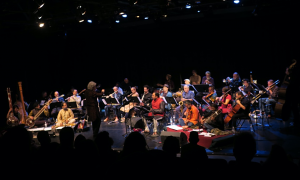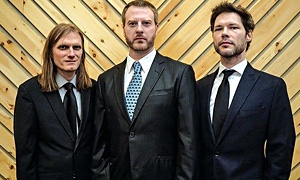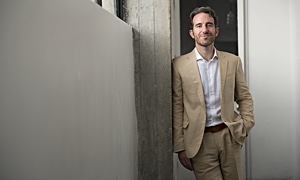Home » Jazz Articles » Live From Philadelphia » January 2012: Craig Ebner, Ravi Coltrane, Lucas Brown an...
January 2012: Craig Ebner, Ravi Coltrane, Lucas Brown and Norman David
Moonstone Arts Center
January 13, 2012
Craig Ebner, a Philadelphia based guitarist best known for his work with organist Joey DeFrancesco, led his quartet through a brief yet powerful set at the Moonstone Arts Center in Center City Philadelphia. Now in its third year, the Moonstone Arts Center operates out of Robin's Bookstore in Center City and hosts jazz shows one or two nights per month. Many of the city's best musicians, including saxophonist Bobby Zankel, pianist Tom Lawton, and vibraphonist Behn Gillece have performed at Moonstone in the past.
Ebner's playing was informed by modern jazz guitarists such as Kurt Rosenwinkel and Mike Moreno. His tone was dark yet pronounced, and his blend of reverb with a slight delay added an intriguingly ethereal touch. Ebner's time on the road with DeFrancesco, from 1999-2002, has helped refine his playing with a thorough sense of bebop and hard-bop styles. Ebner also made use of a volume pedal to create dynamic swells and unique textures during his chordal playing. Ebner was joined by trumpeter John Swana, another legend in Philadelphia who has made the switch to an instrument known as the EVI (Electronic Valve Instrument), played much like a trumpet, but with the capabilities of a synthesizer. Swana used several effects racks to create unique tones, often blending new effects within individual songs as he reacted to the sound of the band. Bassist Justin Sekelewski and drummer Carl Moritz, both busy sidemen in Philadelphia, rounded out the group.
The set opened with a brooding arrangement of Wayne Shorter's "Fall," played in 7/4 after a textural intro featuring melodic interplay between Swana and Ebner. The band was able to create a hypnotic backdrop for each soloist, which seemed to fit the style of the tune perfectly. Next was the John Coltrane standard "Satellite," arranged with precise rhythmic hits on the melody. Hearing Swana play through the tune's complex chord changes combined with the effects used on his instrument was a very unique experience. Swana's sound was one of a kind, and he has mastered an instrument played by very few people.
"Satellite" was followed up by "Lush Life," a Billy Strayhorn ballad which featured a solo introduction by Ebner. What makes his style unique amongst the many accomplished guitar players residing in Philadelphia is that he seems to have absorbed a modern sound while retaining vocabulary that is firmly rooted in traditional jazz. His compositional skills were also on display for the set closer, an extended original piece influenced heavily by Indian classical music and Ebner's study of the sitar, "Khan-Chi." The piece shifted through several changes in meter and tempo and seemed to be largely through-composed. Ebner retuned his guitar in order to allow the lower strings of his guitar to act as constant droning bass tones, while leaving the higher strings available for melodic development. Swana created swirling textures by running his instrument through a thick blend of reverb and delay. The interplay in this group was very developed, and jazz audiences in Philadelphia hope to hear more from them in the future.
Ravi Coltrane Quintet
Annenberg Center
January 14, 2010
Tenor saxophonist Ravi Coltrane led his quintet through two sets at UPENN's Annenberg Center for the Performing Arts. Though he is the son of legendary saxophonist John Coltrane, Ravi has certainly proven his own musical abilities to be extremely advanced. His command of the saxophone was obvious as he played effortlessly in any range, displaying a huge vocabulary which can only emerge naturally from rigorous personal study.
Several of Coltrane's selections were modern-sounding straight- eighth originals, perhaps showing some influence from more contemporary players on today's jazz scene. Though the music was new, much of Coltrane's playing seems rooted in hard bop. This seems to keep the new compositions grounded by retaining much of the character present in traditional jazz while keeping the improvisations from straying too far into avant- garde territory. Coltrane's pianist, David Virelles, seemed to be the most adventurous soloist in the group, creating interesting textures by slowly playing a dissonant arpeggio while letting each note ring into the next, much in the style of expat Canadian pianist Paul Bley. While soloing, Virelles seemed to use disjointed rhythmic ideas to create a natural tension, a device used by other modern pianists such as Jason Moran. Coltrane's original tunes were a perfect building block for pianistic improvisations. The band closed its brief first set with Thelonious Monk's "Epistrophy," arranged with a deliberately lumbering, half-time feel on the A sections and a driving swing feel on the bridge. It was a feature for drummer Karriem Riggins, who played with several different shifting polyrhythmic ideas and sharp accents, while the band played the form steadily behind him.
The second set began with an up-tempo run through of Ornette Coleman's "Bird Food," a refreshingly uncommon blues amongst today's musicians. This tune, as well as much of the second set, featured bassist Robert Hurst, whose technical abilities made him sound more like a horn player than a bassist while soloing. His playing had all the natural inflections of a bebopper, a trait which does not come naturally to all bassists. During sections of trading, Hurst went back-and-forth between Coltrane and trumpeter Ralph Alessi, as any of soloist would. Alessi's Middle Eastern-tinged, "Cobb's Hill," followed; it was a great foundation for solos by both horn players, which began spaciously, but slowly developed into a deliberate cacophony of instrumental prowess and passionate improvisation. Coltrane's group left the crowd the Annenberg Center in awe , and they showed their appreciation in return with a standing ovation which lasted long after the band had exited the stage.
Lucas Brown Quartet
Time
January 18, 2012
Organist Lucas Brown assembled a quartet including some of the best musicians on the Philadelphia jazz scene, joined by saxophonist Victor North, EVI player John Swana and drummer Byron Landham, each of whom has a strong reputation amongst fans and other musicians. The band played several sets, and included tunes by Joe Henderson, Wayne Shorter, Duke Pearson and Hank Mobley. Many other musicians from the area were in attendance at the show, supporting the abilities of each member of the group.
Brown's style combined the soulful feel of a classic organist such as Jimmy Smith with the advanced vocabulary of today's inquisitive improvising musicians. The bass lines he constructed while soloing and accompanying others sounded as if they were played by an actual bassist, and add to the strong swing feel of the group, especially when playing up-tempo. Swana showcased his bebop vocabulary, while his varying use of effects provided a unique contrast from the rest of the group. North, a busy member of the current jazz scene in Philadelphia, provided a hard bop edge to the group. His playing was reminiscent of John Coltrane in terms of language, but with the feel of hard bop giants such as Hank Mobley. Landham is one of the first drummers that comes to mind when people talk about the sound of "Philly Swing," touring extensively for several years with many different artists and recording with Joey DeFrancesco. Although Time is not exclusively a listening venue, Landham's solos got the attention of the whole room. His deep swing feel was reminiscent of several legendary jazz drummers, but Landham has clearly managed to carve a distinctive sound of his own, making him a much sought-after sideman.
Other groups which feature Brown perform at Time regularly, and he has also hosted several jam sessions at Chris's Jazz Café. Three Blind Mice, a trio featuring Brown and North along with drummer Wayne Smith Jr., has performed in Philadelphia for a few years, and plays in the style of a classic organ trio, but with an updated musical parlance. Brown also leads a trio called Skyline, with drummer Anwar Marshall and guitarist Jason Klinke. Skyline's repertoire also pulls from the classic compositions of 1950s and '60s hard bop greats, but within the classic organ trio format.
Norman David & The Eleventet
Plays & Players Theatre
January 30, 2012
After 30 years of constant development, composer Norman David and his Eleventet have finally found a home at Plays and Players, an intimate theatre tucked away in one of Center City Philadelphia's many side streets. The Eleventet has a regular monthly booking at the theatre, and has used the opportunity to codify its individual sound. The band's lineup is fairly consistent, but guests do occasionally perform with the group or sub in for other musicians when they are unavailable. With a seemingly endless repertoire, the band provides a unique experience to repeat listeners, who pay only $8 to hear two burning sets of music.
It was obvious that David's musical palette extends far beyond the realm of jazz. Certain characteristics of 20th century classical music are very apparent in his compositions, but in a style which is less jarring to an audience comprised mainly of jazz fans. Certain pieces contained melodies based on 12-tone rows, while dense chords voiced across the horn section provided a basis for free improvisation. During David's"Not Again," each horn player held one note of a dissonant chord voicing while David and the rhythm section improvised freely until the piece naturally found its way back to the original melody. Each musician seemed to have a natural sense of where the music wanted to go, and they were afforded the freedom to explore each composition to its fullest extent.
David did not provide much specific direction to the band, rarely signaling more than a few cues during the solo sections. His style relied on the versatility of the band and ultimately allowed a more natural sound to emerge. The Eleventet did not operate in the style of a big band, instead favoring an approach closer to that of a smaller group, where more aspects of the music are left to interpretation. Interaction and improvisation were the general themes of each performance, and the group never stuck to deliberate arrangements or preconceived solos.
Eleventet is one of the city's best-known jazz groups; featuring some of Philadelphia's best soloists, including alto saxophonist Mike Cemprola and pianist Tom Lawton, it was certainly great to hear everyone stretch out. Each musician was well-versed in the jazz tradition and a conventional smaller group setting where the freedom to explore new musical territory was uninhibited. What made this group unique was that none of this was lost simply because there were eleven players instead of three or four. Few jazz groups have as much fun as The Eleventet appears to, at each and every show.
< Previous
Quadrophenia
Next >
Zomo Hall
Comments
Tags
Live From Philadelphia
RJ Johnson
United States
Pennsylvania
Philadelphia
Moonstone Arts Center
Craig Ebner
Joey DeFrancesco
Bobby Zankel
Tom Lawton
Behn Gillece
Kurt Rosenwinkel
Mike Moreno
John Swana
Wayne Shorter
John Coltrane
Billy Strayhorn
Ravi Coltrane
David Virelles
Paul Bley
jason moran
Thelonious Monk
Karriem Riggins
Ornette Coleman
Robert Hurst
Ralph Alessi
Time
Lucas Brown
Victor North
Byron Landham
Joe Henderson
Duke Pearson
Hank Mobley
Jimmy Smith
Wayne Smith Jr,
Anwar Marshall
Plays & Players Theatre
Norman David
Mike Cemprola
For the Love of Jazz
 All About Jazz has been a pillar of jazz since 1995, championing it as an art form and, more importantly, supporting the musicians who create it. Our enduring commitment has made "AAJ" one of the most culturally important websites of its kind, read by hundreds of thousands of fans, musicians and industry figures every month.
All About Jazz has been a pillar of jazz since 1995, championing it as an art form and, more importantly, supporting the musicians who create it. Our enduring commitment has made "AAJ" one of the most culturally important websites of its kind, read by hundreds of thousands of fans, musicians and industry figures every month.






















